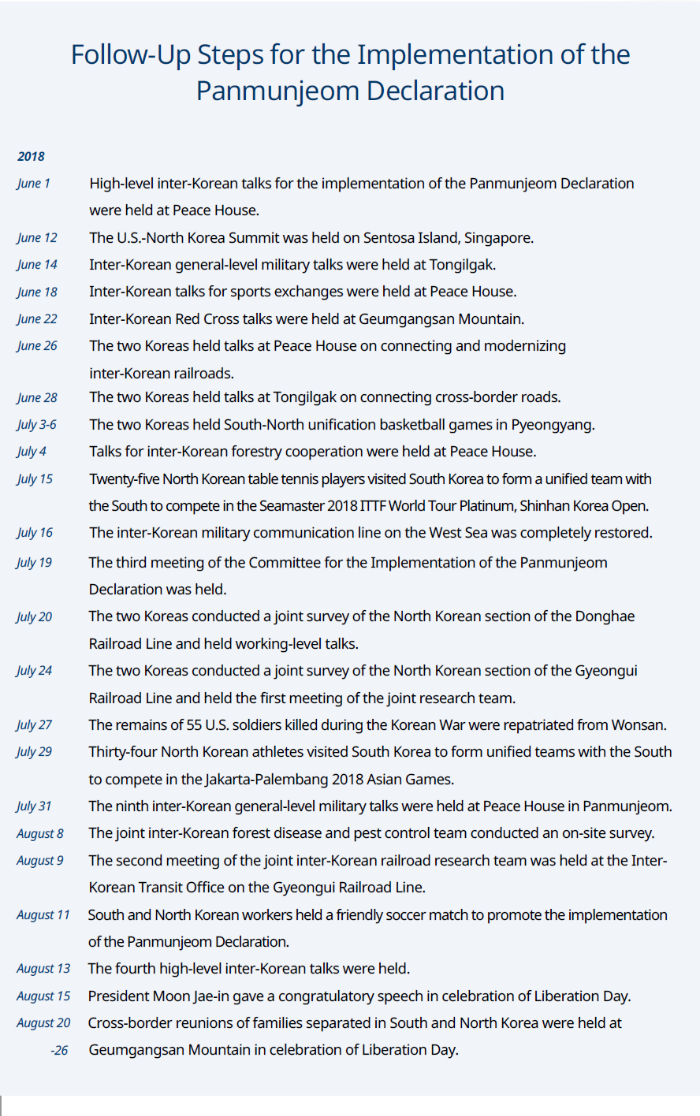Post-Panmunjeom Declaration Achievements
Post-Panmunjeom Declaration Assessments Peace becoming part of everyday lives
In 2017, the Korean Peninsula saw recurring volatile crises caused by North Korea’s nuclear test
and 15 ballistic missile launches, escalating the threat of war to a new height. The risk of accidental
confrontation persisted due to the lack of communication channels between the militaries of the
two Koreas and those of the North and the United States.
The April 27 Panmunjeom Declaration for Peace, Prosperity and Unification of the Korean
Peninsula, however, culminated in agreement that the North would discuss the complete
denuclearization of the Peninsula and establishment of a permanent and solid peace regime with
the South and the United States. It has made it possible for the Korean people to completely escape
the fear of war and for peace to become the norm. As a result, problems associated with the socalled
“Korea discount” began to show signs of abating.
Foreign investors are piling billions of dollars into South Korean bonds as the local currency stabilizes and tensions with North Korea appear to wind down. South Korea has turned out to be “the only bright spot” in the emerging debt market of Asia this year as more than $16 billion of foreign money has flown into it. Bloomberg, May 8, 2018
This past year, North Korea has conducted no nuclear test or missile launch. The North took initial
steps to remove the risk of war on the Korean Peninsula at its roots by dismantling its nuclear and
missile test sites.
Moody’s Senior Credit Officer Christian de Guzman said on May 1 that if irreversible measures
facilitating inter-Korean reconciliation continued, it would have a positive impact on South Korea’s
credit rating.
The restoration of the suspended cross-border military hotline and talks between South and North
Korean military authorities will help gradually build military trust and eliminate the possibility of
an accidental clash.
Mutual trust and respect basis for new normalization
of inter-Korean
relations and more frequent talks
The first inter-Korean summit in 11 years and the Panmunjeom Declaration have enabled inter-
Korean relations to launch a new beginning, going beyond a simple restoration of ties.
Since the turn of this year, inter-Korean relations have been progressively restored through
a series of events, including North Korean athletes’ participation in the PyeongChang Winter
Olympics, reciprocal visits by special envoys between the two Koreas and mutual visits and
performances by South and North Korean art troupes. In the process of implementing the
Panmunjeom Declaration, high-level, sector-specific inter-Korean talks and meetings have been
held and regularized, institutionalizing the framework for consultations between South and North
Korea.
The leaders of the two Koreas have also established a relationship based on mutual trust to the
extent that they can easily call and casually agree to meet on short notice. They went so far as to
skip cumbersome procedures and formalities to hold their second summit on May 26.
The spontaneous offer by Kim to meet, and Moon’s quick acceptance, showed how close the two leaders have become. The Guardian, May 27, 2018
Both Koreas restoring sense of common identity naturally through experiences shared by residents in South and North
Inter-Korean exchanges and cooperation in various areas, for instance through the July 2018
South-North unification basketball games and the forming of joint teams for the 2018 Asian Games
(August 18-September 2), will help increase opportunities for South and North Koreans to meet
and restore a sense of commonality.
The two sides held reunions for families separated by the division of Korea for the first time in
three years. The reunions may have helped heal the wounds of those who have lived with pain
and sorrow, albeit in a small way.
More contact between North Korea and international community on all fronts
With the Panmunjeom Declaration as a catalyst, the historic North Korea-United States summit was held and the Singapore joint statement adopted. Increasing opportunities for talks and contacts between North Korea and many other countries will provide opportunities for the North to become a member of the international community.
If anyone deserves credit for this achievement it is South Korean President Moon, whose
fingerprints are all over the Trump-Kim statement…Bringing these two impulsive and
headstrong leaders together was a remarkable achievement. Reuters, June 13, 2018
After months of rapprochement—including summit meetings between North Korean leader
Kim Jong Un and South Korean President Moon Jae-in, and one between Mr. Kim and President
Donald Trump—hopes are rising for more open access to North Korea, a country of 25 million
people with vast mineral reserves and lots of cheap labor. Wall Street Journal, July 23, 2018
As North Korea’s leader Kim Jong-un develops relationships with other nations through
summit diplomacy, global financial institutions have shown a willingness to help him grow
North Korea’s economy. The International Monetary Fund, with a lending capacity of nearly
US$700 billion for its current 189 member countries, would “seek to be helpful” should North
Korea want to join the institution, an IMF official told the South China Morning Post this week. SCMP, July 13, 2018


